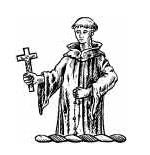
Meet the Urban Monk
SPIRITUAL WARFARE ON THE STREETS OF BALTIMORE
It is Good Friday on the streets of inner-city Baltimore, the same ones seen in HBO’s lifelike crime series The Wire. We process along streets where drugs and guns are the dominant business, and where a few months earlier a five-year-old girl running an errand was felled by stray gunfire, causing remorse even in this city numb to violence. Seventy-two-year-old Benedictine monk Fr. Paschal Morlino leads an old-style Catholic procession with fifty-five of his parishioners, three large crosses draped in red, and wooden noisemakers. Dressed in his black Benedictine habit, he leads with hymns sung through his megaphone. We wind through back streets until we reach one on which half the houses are abandoned and trash is strewn about. An elderly, wheelchair-bound woman waits fragilely in front of her rowhouse. She’s one of a dozen shut-in parishioners we are visiting during our procession. Fr. Paschal gives her an Easter lily, a gift of St. Benedict’s Church, where for twenty-six years he has served as the lone permanent priest.
On any modern college campus, or in any upscale suburban neighborhood, a procession like ours would be met with smirks, jeers, or even lawsuits. But on these lawless urban streets we meet quiet respect. The woman in the wheelchair is visibly moved by our visit, as is her companion who had carried her to the curb. Elsewhere, a tattooed teen stops and keeps making the sign of the cross until we pass by. An elderly woman sitting on her steps bows her head, hands folded in prayer, until we finish passing. Mothers and kids watch us quietly from doorways or upper-floor windows. Fr. Paschal leads us across the local shopping center, chanting, “Jesus, remember me when you come into your Kingdom.” We pray one station outside the supermarket, and receive more than a few approving nods from passersby. The only evident scorn was from a Jehovah’s Witness distributing Watchtower tracts.
Fr. Paschal’s little procession would have met with similar scorn from many of America’s founders, for whom monks were the embodiment of old-world ignorance. William Blackstone, the great jurist of the age, wrote famously of “the dark ages of monkish superstition and civil tyranny” in his Commentaries on the Laws of England. Similarly, shortly before his death, Thomas Jefferson wrote that the American Revolution had launched “half a century of experience and prosperity…. May it be to the world…the signal of arousing men to burst the chains under which monkish ignorance and superstition had persuaded them to bind themselves, and to assume the blessings and security of self-government…[which] restores the free right to the unbounded exercise of reason.”
Yet perhaps some of the approval we glimpse on Baltimore’s “mean streets” arises from a dim sense that this confident wisdom of the world has led to a loss of security that makes the “chains of monkish superstition” appear attractive. “Forty years ago I never could have dreamed how far the city would sink. What’s happened would have seemed unimaginable,” explains a local acquaintance. Many indicators of collapse could be cited, but the starkest is the violence. Baltimore’s streets witnessed ten murders over the Memorial Day weekend. By way of comparison, American armed forces at war in Iraq and Afghanistan suffered three deaths during those same days.
You May Also Enjoy
If we place a social ministry ahead of the salvation of souls (the Great Commission), then we fail not only those we are trying to help, but ourselves and God as well.
The Mystery of Harvard... The Power and the Gender... The Real Point of Difference... Fatima and Jeane Dixon
In the process of working on this essay, I read Jeffrey Christensen’s article, “A Protestant…

